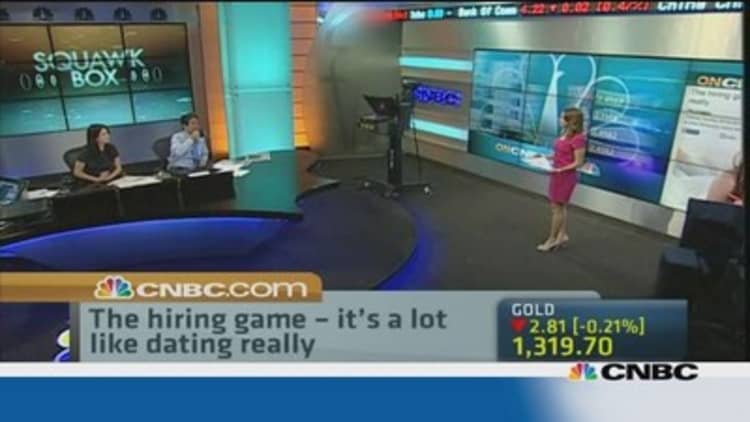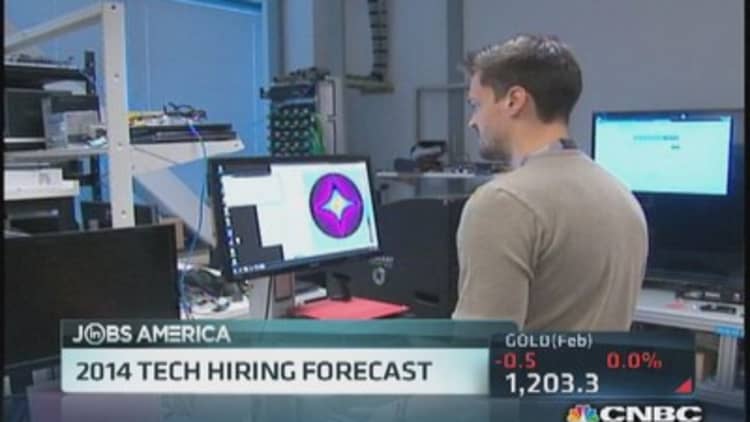
A gentle introduction from a friend, meeting up for an informal coffee, exchanges of text messages and birthday cards. What sounds a lot like dating in fact describes recruiting.
How workers perceive career progression together with the explosion of social media and new technology has transformed the recruitment process, making it more akin to dating, experts say.
(Read more: Don't judge job seekers by their Facebook covers)
"The recession and lay-offs that followed the global financial crisis changed the psychology of job seekers. The thinking goes: I cannot trust the company I am with right now to be the one I will be with in three years' time," said Dan Finnigan, CEO of Jobvite, a recruiting platform that allows clients such as Starbucks and online retailer Zappos to make the best use of social networks in hiring.
"Because of the internet and mobile devices it's much easier to look for a job, so people are always shopping and always applying. That's a key aspect and social networks have made it more prevalent," he said. "Job seeking now is kind of related to dating, in that people are being introduced to each other to see if they want to spend more time together."
And in an environment where the competition for talent in sectors such as technology can be fierce, courting a potential candidate can pay off.
(Read more: Twitter pays engineer $10 mln as Silicon Valley tussles for talent)
George McFerran, the managing director for Asia-Pacific at recruiter eFinancialCareers, has this story: "I know one contact who was courted by two tech companies and he decided to work for one and rejected the offer from the other."

"The company that he'd rejected said ok but let's keep in touch and every year they sent him a birthday card or dropped him a phone call now and then. Two-and-a-half years on and he decided that the job he had with the tech firm wasn't working out, so he contacted the company he had rejected and they said let's have a chat and now he's gone to work for them."
In a survey by recruitment firm Kelly Services released late last year, 56 percent of 25,000 workers surveyed across Asia Pacific said they are now more inclined to search for jobs on social media than through traditional methods such as newspaper advertisements, online job boards or recruitment companies, up from 47 percent in the previous annual survey. 51 percent said they use their social media networks when making career or employment decisions.
Refer a friend
Against a backdrop where employees are constantly networking through portals such as LinkedIn and maintaining a social profile that might help their career path, recruiting through referrals has gained importance.
(Read more: 'Coffices' take off as the work place goes mobile)
In fact, recruiters say that those employees hired through a personal reference tend to understand a company's culture better and therefore stay longer with a firm than those hired via more traditional routes.
"Recruiters, HR managers and hiring managers are reasonably good at identifying candidates with the right hard skills using traditional approaches, such as structured interviewing or assessment centers, but it's a lot more difficult hiring for soft skills," said Michael Wright, the head of talent acquisition for Asia-Pacific at GroupM, the media investment management arm of WPP – the world leader in marketing communications services.
"Our clients retain us for the high caliber thinking our talent can deliver so that makes us exceptionally particular in our hiring. Past performance remains a great predictor so we thoroughly investigate the opinions of former co-workers to validate the potential of a candidate," he added "That also translates to referrals being an optimal route for us and many of our successful hires come through referrals."
According to Jobvite's Finnigan, about 40 percent of all hires on the jobvite platform are made through employee referrals.
Data from eFinancial careers shows that 42 percent of workers in Singapore say networking with their peers is the preferred way to build their career. This was followed by staying up to date with industry news and analysts, which was the preferred choice for 26 percent of those surveyed.
(Read more: The best and brightest are turning away from Wall Street)
"I am old fashioned, I like to recruit the traditional way, but I know the world is changing, it's all about networking," said one senior manager at a multi-national firm in Singapore, declining to give his name. "I think referrals are the best way to go, nobody is really going to recommend someone that will make them look bad."
— Writing by CNBC's Dhara Ranasinghe. Follow her on Twitter at @DharaCNBC


